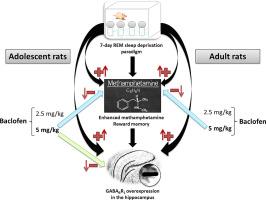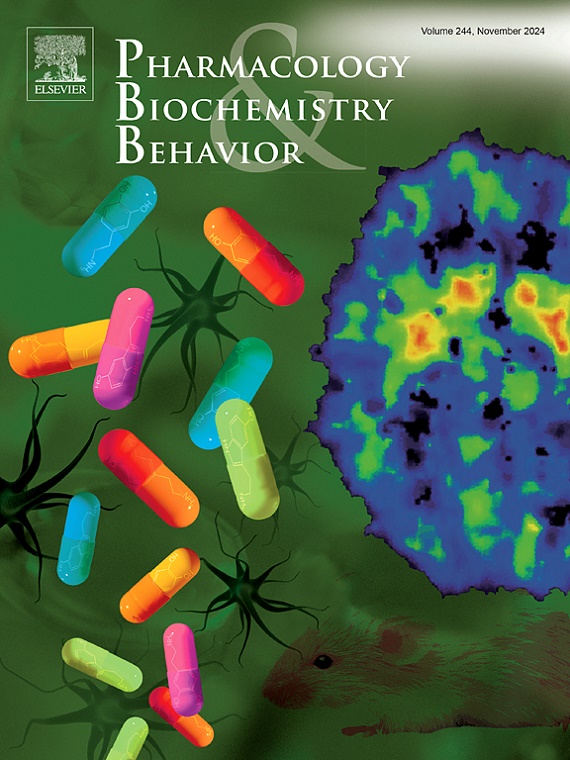Targeting retrieval of methamphetamine reward memory in the context of REM sleep deprivation: Age-dependent role of GABAB receptors
IF 2.5
3区 心理学
Q1 BEHAVIORAL SCIENCES
引用次数: 0
Abstract
GABAB receptors play a modulatory role in the mechanisms underlying drug addiction, sleep problems, and aging; however, there are few studies addressing their relationships to each other. Therefore, this study aimed to examine whether blockade of these receptors affects methamphetamine (METH) reward memory in adult and adolescent rapid-eye movement sleep-deprived (RSD) rats. Adolescent and adult male Wistar rats were subjected to RSD for seven days. They were then conditioned to receive methamphetamine (METH; 2 mg/kg, ip) during an eight-day conditioning period. METH reward memory was then reactivated during a retrieval trial and the GABAB receptor agonist baclofen (2.5 or 5 mg/kg, ip) was injected prior to the retrieval trial. Afterward, animals were retested for the expression of conditioned place preference (CPP) and hippocampal expression of GABAB receptors. Baclofen dose-dependently decreased the retrieval of METH reward memory in control and RSD adult and adolescent rats, but its effects were stronger at the higher dose. Moreover, we found stronger effects of baclofen in adolescent animals than in adult ones. In addition, baclofen at its higher dose decreased GABAB overexpression in the hippocampus of adolescent rats, but not in adult rats. These findings shed new light on the mechanisms underlying the role of GABAB receptors in the retrieval of METH reward memory and highlight the importance of considering age and sleep problems in understanding addiction. Further research could potentially lead to the development of therapeutics for individuals struggling with METH addiction.

在快速眼动睡眠剥夺的情况下,针对甲基苯丙胺奖赏记忆的检索:GABAB受体的作用与年龄有关
GABAB 受体在药物成瘾、睡眠问题和衰老的内在机制中起着调节作用;然而,很少有研究探讨它们之间的关系。因此,本研究旨在探讨阻断这些受体是否会影响成年和青少年快速眼动睡眠剥夺(RSD)大鼠的甲基苯丙胺(METH)奖赏记忆。对青少年和成年雄性 Wistar 大鼠进行为期七天的 RSD。然后在为期八天的条件反射期中让它们接受甲基苯丙胺(METH;2 毫克/千克,ip)。然后在检索试验中重新激活 METH 奖励记忆,并在检索试验前注射 GABAB 受体激动剂巴氯芬(2.5 或 5 毫克/千克,ip)。之后,重新测试动物的条件性位置偏好(CPP)表达和海马GABAB受体的表达。巴氯芬剂量依赖性地降低了对照组和RSD成年大鼠及青少年大鼠对METH奖赏记忆的检索,但剂量越大,效果越强。此外,我们还发现巴氯芬对青少年大鼠的作用比对成年大鼠更强。此外,较高剂量的巴氯芬还能降低青少年大鼠海马中 GABAB 的过度表达,而对成年大鼠则没有影响。这些发现为GABAB受体在METH奖赏记忆检索中的作用机制提供了新的思路,并强调了在理解成瘾时考虑年龄和睡眠模式的重要性。进一步的研究有可能开发出治疗METH成瘾患者的药物。
本文章由计算机程序翻译,如有差异,请以英文原文为准。
求助全文
约1分钟内获得全文
求助全文
来源期刊
CiteScore
6.40
自引率
2.80%
发文量
122
审稿时长
38 days
期刊介绍:
Pharmacology Biochemistry & Behavior publishes original reports in the areas of pharmacology and biochemistry in which the primary emphasis and theoretical context are behavioral. Contributions may involve clinical, preclinical, or basic research. Purely biochemical or toxicology studies will not be published. Papers describing the behavioral effects of novel drugs in models of psychiatric, neurological and cognitive disorders, and central pain must include a positive control unless the paper is on a disease where such a drug is not available yet. Papers focusing on physiological processes (e.g., peripheral pain mechanisms, body temperature regulation, seizure activity) are not accepted as we would like to retain the focus of Pharmacology Biochemistry & Behavior on behavior and its interaction with the biochemistry and neurochemistry of the central nervous system. Papers describing the effects of plant materials are generally not considered, unless the active ingredients are studied, the extraction method is well described, the doses tested are known, and clear and definite experimental evidence on the mechanism of action of the active ingredients is provided.

 求助内容:
求助内容: 应助结果提醒方式:
应助结果提醒方式:


